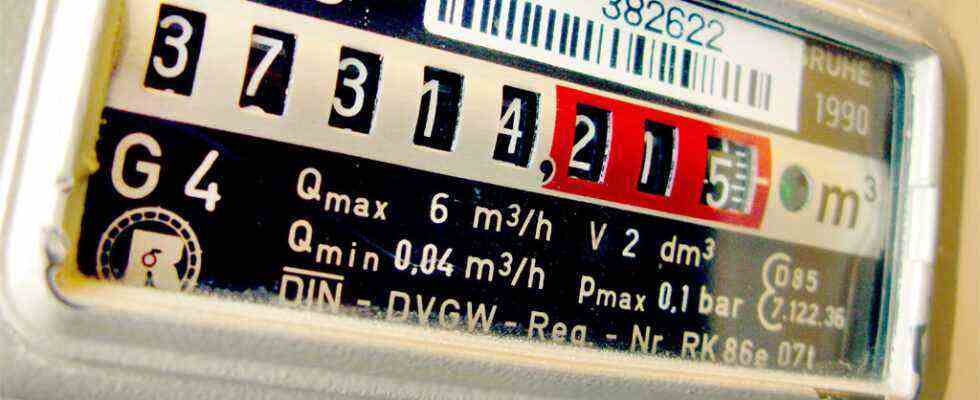Status: 01/14/2022 08:12 a.m
Gas prices rose at the turn of the year. This not only poses major challenges for private households, but also for many companies – or even drives some into insolvency.
When Stefan Böll walks through the large hall of the cardboard factory, the managing director’s heart almost breaks. Because the big cardboard machine is standing still. Not because the Gernsbach company “Baden Board” had no orders or the warehouses were empty. But simply because the company can no longer afford to operate the machines.
4.5 million euros for gas
“Energy prices are very volatile and have risen sharply in the past six months, especially the price of gas,” complains Böll. “Just the pre-financing of the gas costs for January, i.e. payable in December, would have been around four to four and a half million euros. These are such huge sums that the company could no longer cope.”
The cardboard factory in the Murg Valley near Baden-Baden consumes 1000 megawatts per day. In the past, this energy requirement accounted for around five to a maximum of 15 percent of the production costs. However, due to the rising prices for gas, which is used to produce electricity here, the production costs are now 30 to 40 percent – too much for a medium-sized company.
So management pulled the emergency brake. On December 30, all turbines and machines were shut down, production was reduced to zero, and 200 employees were released. Managing Director Böll can only guess why the gas prices have risen so much: “There are certainly many reasons. The economic recovery after Corona, the high demand from Asia for liquid gas, the current topics relating to Ukraine, and I think a bit too far also politics, what is practiced here.”
The gas supplier collects only part of it
In fact, the gas price in Germany is made up of several factors, as the example of a single-family house shows: According to the Federal Association of Energy and Water Management, 46 percent of the gas price here is attributable to the procurement and sale of the gas. This is the money that ultimately ends up with the gas company. Added to this are the network charges incurred for the use of the networks at 23 percent. And finally the levies, taxes and the price of CO2 at 31 percent. In other words: the respective gas supplier receives less than half of the gas price paid by the user – the rest goes to the network operator and the state in the form of taxes and duties.
The managing director of the cardboard factory in Murgtal is not entirely wrong in assuming that there are also political reasons behind the rise in gas prices. Because in its climate package, the federal government has decided on a CO2 tax. Last year, this amount was 25 euros per tonne of climate-damaging carbon dioxide emissions; since this year 30 euros are due. By 2025, the climate tax is to rise to 55 euros per tonne of CO2.
“Global influences have a strong effect”
But there are also other factors outside of German influence that are driving up the price: “The gas price is formed worldwide, global influences have a strong impact on the prices in European gas wholesale,” explains Timm Kehler, head of the industry association “Zukunft Gas”. “The price increase started last year and was triggered by developments in Asia, where economic activity increased much faster than in Europe after the Corona crisis. At the same time, lower yields from wind energy in many parts of the world led to higher demand for other energy sources, which had a corresponding effect on the gas price.”
In the summer, many market participants expected prices to fall, but this did not happen, Kehler continued. “That’s why gas storage facilities in Europe, for example, which had been heavily emptied after the cold winter of 2020/21, had to be refilled at high prices for the coming winter.”
The energy suppliers are also reacting with uncertainty
The increased energy prices seem to unsettle not only end consumers, but also some energy suppliers. At the end of last year, Stadtwerke Stuttgart surprisingly announced that it no longer wanted to take on any new customers. Reason: the “strong price increases and fluctuations in the gas sector”.
The criticism came promptly. Haus & Grund called the procedure “unacceptable”: “It’s not okay to slam the door in the face of new customers,” says Managing Director Ulrich Wecker, “not even when prices on the energy market are on a rollercoaster ride.” Haus & Grund explains that they understand that the extremely fluctuating procurement prices are currently making it difficult to calculate the offer prices over the long term. However, this development has been apparent for some time.
New customers have to accept massive price increases
The Stadtwerke Stuttgart have meanwhile given in and announced that they will take on new customers again. However, they would have to pay 14.85 cents per kilowatt hour – and thus almost double the tariff for existing customers, which is 7.85 cents. These prices for new customers are based on the “current market price”, the public utility company announced. And further: “Triggers of the development are, among other things, extremely high prices for natural gas worldwide and significantly higher prices for CO2 certificates for power plant operators.”
The cardboard factory in the Murg Valley would have celebrated its 140th anniversary this year. But now production is at a standstill. Nevertheless, one does not want to completely give up hope here. Three interested parties have now registered; Investors who could imagine buying and continuing the company. Despite the high energy costs.

